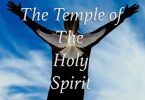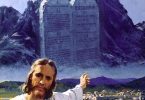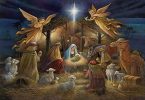Second Sunday of Ordinary Time (Year B)
Scriptures: 1Sam. 3:3-10, 19; Ps. 39:2, 4, 7-10; 1 Cor. 6:13-15, 17-20; Jn. 1:35-42
Having celebrated the feast of the baptism of the Lord and initiating in the ordinary time, the liturgy of this Sunday rightly invites us to live in the presence of the Lord. The first book of the Bible tells us that Adam and Eve, our first parents lived in the presence of God. The sin of man, made him be thrown out of God’s presence. The books of Pentateuch (first five books of the Old Testament) help us to realise that God was present with the people of Israel from the garden to the wilderness. The people of Israel slowly grew up in the belief of recognising God’s presence in the Ark of the Covenant.
The first reading from the first book of Samuel tells us that the people believed God’s presence in the Ark of the Covenant. It is important to know about the Ark of the Covenant. The book of Hebrews gives us a little description of the Ark of the Covenant. It says that the Ark of the Covenant contained the two tablets on which the ten commandments were inscribed, the gold jar of manna and Aaron’s staff that was budded. Once the Israelites in the promised land, the Ark of the Covenant was stationed in Shiloh. Samuel was dedicated to God by his mother. His duty was to remain in the presence of the Ark of the Covenant which was the holiest of holies. It was considered to be the most unique presence of God in the midst of Israel.
The background to the call of Samuel was dark as the night. The opening verse of chapter 3 tells us that the Word of God was rare during those days. This is well supported by the previous book of Judges. It says, “all the people did what was right in their own eyes.” (Judges 21:25). The sons of Eli also did what was right in their own eyes (1 Sam. 2:11-17). It was their duty to be in the presence of God but they failed in it. Samuel chose to be in the presence of God. He was called by God tree times. The triple invitation was not a hallucination but real call of God to Samuel. Samuel responded to God’s call and the Lord was with him. We know Samuel is a towering figure in the transition of the period of Judges to the kingship. Samuel lived a very upright life. He never let the word of God fail to the ground.
The solemnity of the nativity of the Lord helped us to understand how God has come to live with us. In the Gospel of Mathew, it is said, “Behold, the virgin shall be with child, and they shall call his name Emmanuel, which means God with us.” (Mt. 1:23) The name does indicate the role of Jesus in the world. Jesus’ role was to make God’s presence felt by man. The writer of Hebrews whom we listen to during the weekdays also says in the very first verse of his letter that God has spoken to us in the last days by his Son (Heb. 1:1-2).
St. John the Baptist who came to introduce God’s mighty plan for humanity and perfects his role by introducing his own disciples to Christ in today’s Gospel. These disciples go after Jesus to know where does he stay. Jesus invites them to stay with him. The scriptures tell us the disciples went and saw where he lived, and stayed with him the rest of that day. The evangelist gives us the exact hour. He says, “it was the tenth hour”. The expression shows that people consider this hour as a new beginning. The people would not carry on any journey or task undertaken. The tenth hour is considered to be 4’o clock according to our timing. We can imagine the Emmaus encounter. The two disciples invited resurrected Jesus who was travelling with them to stay with them that evening. (Lk. 24:13-35). The encounter was a new beginning in their lives. So It was a new beginning for St. Andrew and his companion. However, there is yet another fact related to the tenth hour. The Israelites sacrificed the lamb on the ninth hour to the eleventh hour. When John, the Baptist had introduced Jesus as the lamb of God, Jesus must have offered a glimpse of sacrifice that he would make for humanity.
The disciples must have definitely spent the whole night with Jesus since they had met him at the tenth hour. St. Augustine writes about it, “what a blessed day they spent, what a blessed night!” (Tractate vii on John) St. Augustine interprets the significance of the tenth hour. He says the ten symbolises the law. God gave ten commandments to Moses. The Jews could not fulfil the law therefore Jesus became man. He says I come not to abolish the law but to fulfil it. (Mt. 5:17).
The Ark of the Covenant which contained the two stone tablets were considered the presence of God in the days of Samuel. These two stone tablets had an inscription of ten commandments. Now there was God himself who was the fulfilment of ten commandments present. The two disciples remained in the presence of Jesus; they got a new life and a new beginning. Hence, one of them, Andrew went out and helped his own brother Peter to come to Jesus.
The liturgy of this Sunday tells us that when we go into the presence of God, he fills us with his grace. There is a new beginning in our lives. Samuel came into the presence of God; he was given a mission to lead the people of Israel. He appointed Saul and David as the king of Israel. Andrew and his companion came into the presence of Jesus; they became the messengers of Jesus. Their lives were changed.
There is a need for us to come before the presence of God. Do we spend time with the Lord? He calls us even today, “come and see”. St. Paul tells Corinthians that our bodies are the temple of the Holy Spirit. It is the spirit that helps us to become aware of God’s presence. God has already given us the special gift of the Holy Spirit. Can we allow the Spirit to lead our lives? Let us become aware of God’s presence in our lives with the help of the Holy Spirit.






